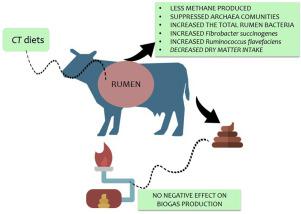Research in Veterinary Science ( IF 2.4 ) Pub Date : 2020-05-22 , DOI: 10.1016/j.rvsc.2020.05.010 Gisele M Fagundes 1 , Gabriela Benetel 2 , Katieli C Welter 2 , Flávia A Melo 2 , James P Muir 3 , Mateus M Carriero 2 , Ricardo L M Souza 2 , Paulo Meo-Filho 2 , Rosa T S Frighetto 4 , Alexandre Berndt 5 , Ives C S Bueno 2

|
The grazing of Zebu cattle in poor-quality tropical pastures during the dry season has an increased environmental impact and cost of production. The use of condensed tannins (CT) as a natural feed additive to modulate ruminal archaea can mitigate the methane emissions from cattle in tropical systems. We investigated the effects of CT on in vivo methane emissions and rumen microbiota ecology in beef cattle. Batch experiments were also conducted to evaluate the impact of dietary CT on the biogas production from beef cattle manure. Six adult rumen-cannulated Nellore cattle were used in a double 3 × 3 Latin square design. Treatments consisted of three diets containing either a 0%, 1.25% or 2.5% CT additive from Acacia mimosa extract. The experimental period consisted of 63 days, and methane production was measured using the sulfur hexafluoride (SF6) technique from Day 16 to 21 of each feeding period. Adding Acacia extract to the diets reduced daily methane emissions per animal. Methane suppression occurred more by reduction of intake than by the direct effect on methanogenic archaea. We verified that CT directly suppresses archaea rumen communities and increases total rumen bacteria. Our study indicates that CT benefit rumen Fibrobactersuccinogenes and Ruminoccous flavefaciens populations and have no negative effect on biogas production from cattle manure. Acacia extract as a feed additive has promising potential as part of an overall nutritional strategy to reduce the methanogenesis from Zebu beef cattle in tropical systems.
中文翻译:

单宁酸是一种天然瘤胃改良剂,可控制热带系统肉牛的甲烷生成:是沼气能源生产的敌对者?
干旱季节在劣质热带牧场放牧的封布牛会增加对环境的影响,并增加生产成本。使用缩合单宁(CT)作为天然饲料添加剂来调节瘤胃古细菌可以减轻热带系统中牛的甲烷排放。我们调查了CT对肉牛体内甲烷排放和瘤胃微生物群生态学的影响。还进行了分批实验,以评估饮食CT对肉牛粪便沼气生产的影响。在双重3×3拉丁方形设计中使用了六只成年瘤胃空心内洛尔牛。治疗方法包括三种饮食,其中含有来自相思草的0%,1.25%或2.5%CT添加剂提取。实验期为63天,从每个进料期的第16天到第21天,使用六氟化硫(SF 6)技术测量甲烷的产生。在饮食中添加阿拉伯胶提取物可减少每只动物每天的甲烷排放量。甲烷的抑制更多是通过减少摄入量,而不是直接影响产甲烷古生菌。我们验证了CT直接抑制了古细菌瘤胃群落并增加了总瘤胃细菌。我们的研究表明,CT利益瘤胃Fibrobactersuccinogenes和Ruminoccous球菌的人口,并有从牛粪沼气生产没有负面影响。金合欢 提取物作为饲料添加剂具有潜在的潜力,可作为整体营养策略的一部分,以减少Zebu肉牛在热带系统中产甲烷的发生。



























 京公网安备 11010802027423号
京公网安备 11010802027423号